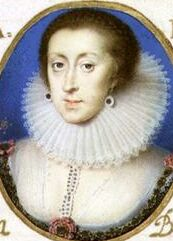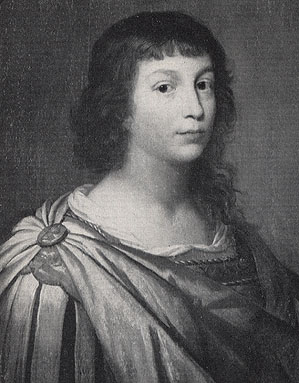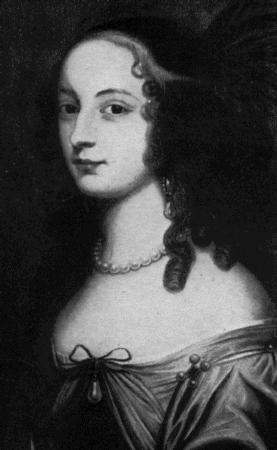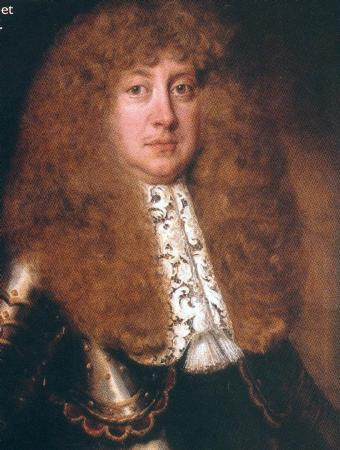







Throughout the spring of 1714 the massive bulk of Queen Anne drifted towards her inevitable expiration. She was meeting her end at a time of dynastic crisis. The Act of Settlement, passed by Parliament in 1701, stipulated that the monarch had to be of the Protestant faith and that he or she could not marry a Roman Catholic. The vast majority of those closest to the throne by blood were Catholic, a fact that automatically barred them from succession. This left an obscure, petty German prince in his mid fifties as the most likely successor to the ill-fated House of Stuart.
The daughter of James I, the first monarch to rule both England and Scotland, was named Elizabeth, in honour of “Good Queen Bess,” the last and greatest of the Tudors. At the age of seventeen she was given in marriage to Frederick, Elector Palatine of the Rhine, the Protestant champion of central Europe. This was a diplomatic move by James for he really wanted an alliance with Spain – a situation that the people and the powers that be in England would not tolerate. In the early 17th century the House of Hapsburg ruled most of the continent. Between the Holy Roman Emperor, with his seat of power in Vienna, and the King of Spain, these cousins had a domain that stretched from the Atlantic to Poland. The Emperor, Ferdinand, attempted to push back the tide of Protestantism in Germany, which only provoked the Protestant German princes to revolt. The conflict was centred on Bohemia where a belligerent nobility had made a habit of obstructing the Hapsburg Emperor. In 1618 the Czech leaders flung the Imperial envoys out of the windows of the royal palace in Prague. This somewhat drastic, un-diplomatic action resulted in a war that was to ravage Germany for the next thirty years. The Czechs immediately offered the throne of Bohemia to Frederick and his acceptance placed him at the head of the Protestant revolt against the Empire. Despite the initial, feverish optimism that usually accompanies most revolts, it did not take Ferdinand long to crush this threat to his power. Frederick and his wife were soon driven out of Bohemia and the land was quickly occupied by Hapsburg troops. Indeed, his reign was so short that he was termed “the Winter King.”
Back in England the clamour was to support Frederick and his English wife. Any move in favour of the deposed Frederick would, however, offend Spain and James was adamantly against such action. Despite the wishes of the King, bands of volunteers and privately subscribed funds were set up, with tacit parliamentary support, to aid the defence of Protestantism. When Parliament screamed for war, James calmly informed them that it was none of their business. The King had his own agenda. He could have leapt in to the continental arena and gained popularity at home by assuming the leadership of the anti-Catholic states but that would have placed him in the hands of others. To fight a war needs money; money means taxation; taxation required the approval of Parliament; Parliament would have undoubtedly wanted to control the expenditure of that money. A situation that James was not prepared to tolerate. This intransigence left Frederick and Elizabeth wandering from court to court in Europe in poverty and exile.
Although Frederick was not very good at holding on to kingdoms, he was extremely efficient at producing children. His twelfth, born in 1630, was named Sophia. In 1658 she was married to Ernest Augustus, fourth son of George, Duke of Kalenberg, a cadet branch of the Guelph family of the House of Brunswick. She could not have been much of a catch as she had already been turned down by one of Ernest’s brothers. At the time of the marriage Ernest Augustus had little prospect of ruling anything. His eldest brother, Christian Ludwig, governed the main portion of the Brunswick inheritance, the Celle Duchy and the second brother, George William, held the Calenberg Duchy, also called Hanover after its capital city. Waiting in the wings was a third brother, John Frederick, should anything happen to the other two. The only thing Ernest had to look forward to was the Catholic prince-bishopric of Osnabruck, an estate and title that, under the Peace of Westphalia, alternated between Protestant and Catholic incumbents. George William must have found Sophia most unattractive, for after he backed out of a marriage contract with her he made a pact with his youngest brother. If Ernest would uphold the family honour and marry, he promised not to marry, thus, his lands and titles would devolve to Ernest and his heirs. Christian died in 1665 leaving his lands to John Frederick who, in turn, succumbed in 1679. In the meantime the agreement between George and Ernest came under threat when George fell in love with a French woman, Eleonora Desmier d’Olbreuse. A compromise was found where by George and Eleonora entered a “marriage of convenience.” This was not binding under church law and any children would not be regarded as legitimate. The loving couple had a daughter, Sophia Dorothea, and George did eventually go through a church ceremony to legitimise his daughter. He made her heiress to his private estate but not his public Duchy. This still made her the most eligible bride on the north European market. At the age of ten she was betrothed to the son of Anton Ulrich, Duke of Brunswick-Wolfenbuttel.
This new marital arrangement presented Ernest and Sophia with a problem. Although he had inherited Hanover in 1679, the union of young Sophia with the Brunswick-Wolfenbuttels, the most senior line of the House of Brunswick, could seriously threaten him gaining the rest. There was, of course, an obvious solution. Ernest and Sophia had a son, George, born in 1660, and George William was persuaded to see the sense of keeping it all in the immediate family. So young Sophia Dorothia married her cousin George Ludwig in 1680.
With the future secure Ernest and Sophia had sights on even greater things. A dukedom or two was all very well but it did not bring power beyond the restrictive confines of their lands. Ernest was looking for a much wider role, one that would take him on to the European stage. By tradition lands were split between the sons of a ruler, thus the parcels gradually became smaller and smaller. Ernest saw this as a slow weakening of economic and political power. He broke with custom and instituted the law of primogeniture – everything went to the eldest son – much to the discontent of his younger sons.
Ernest then entered into long, protracted negotiations with the other German princes. He was after an Electorate. Electors were the small group of princes who elected the Holy Roman Emperor. The position of Emperor was not hereditary and, although for the last few hundred years the office had gone to a member of the Hapsburg family, the various candidates had to consider the views of the Electors and treat them with respect. Some of the Electors were Catholic and they were balanced by a similar number from the Protestant faith. To bring the Catholics on board Ernest insinuated that he might be willing to convert to Catholicism. Surprisingly the most damaging opposition to his appointment came from his elder brother, George William. He felt that the office should come to him as the senior member of the family. William III of England had close contacts with George and managed to persuade him to acquiesce. The ace in the hole held by Ernest was his Hanoverian army. These regiments were highly trained, crack troops of their day – the 17th Century equivalent of the Parachute Regiments or the Marine Corps. William III’s intention was to bring this prize fighting force on to the side against the growing power of France. To further Ernest’s course even more King William gained the support of Charles XII, King of Sweden, in his capacity as Duke of Bremen, Verden, Wismar and Pomerania.
Although Ernest was accepted as an Elector, the Emperor Leopold and his successors put off the investiture because they were concerned that this new Protestant influence might upset the delicate balance between the two branches of the faith. It was not until 1708, long after Ernest’s death, that the Hanoverian Electorate was officially invested. Even then it only came about by young George’s skilful use of his army in the War of the Spanish Succession. George William also picked this opportune moment to die in 1715 which brought his nephew additional estates to strengthen his hand.
The Electorate of Hanover had been referred to as “beggarly” as the 17th Century came to a close. However, with the passing of the Act of Settlement in the British Parliament, new vistas opened before George. His mother became the Protestant heiress to the throne of Great Britain.
Despite statutory backing it was no foregone conclusion that the House of Hanover would follow the House of Stuart. The “Glorious Revolution” of 1688 may have deprived Catholic James II of his throne but, with the support of Louis XIV, King of France, there were still powers within Great Britain that hankered after the old Monarchy. They did not wish to see a foreign, German king wearing the crown. When James eventually died in September 1701, allegiance gathered behind his son, also James, known to history as “the Old Pretender.” Intrigue and plots continued and there was a regular toing and frowing across the Channel to France of secret agents and spies, all dedicated to the restoration of the “rightful king.” When the Act of Union was passed, joining Scotland to England, unrest was rife in the north of the island. Louis took advantage of this discontent to mount an expedition in 1708. This turned into an utter fiasco. Although the French fleet managed to enter the Firth of Forth, arrangements to receive “King James III” went seriously awry and the French were driven out to sea by an English naval force. The French then attempted to land near Aberdeen but once again disorganisation thwarted their efforts and the fleet returned to France.
In 1710 a Tory ministry was elected to Parliament and Jacobite (supporters of James) hopes rose. They were intent on ending the war with France and negotiated the Treaty of Utrecht in April 1713. One of the clauses required that James be expelled from France – this was the price the Tories had to pay for opposition, Whig, support for the treaty. James moved to Bar-le-Duc in Lorraine but it was merely a matter of geography not of sentiment. In general the Whig party were opposed to the Stuarts and the Roman Catholic Church. Indeed, many of them still harboured the old republican principles of the Commonwealth. They would have preferred no monarch at all but a Protestant, German king was better than a Catholic Stuart. It was a case of the lesser of two evils. Despite their political allegiances neither Whig nor Tory would openly commit themselves one way or the other.
With the health of Queen Anne rapidly deteriorating both parties jockeyed for position. Her principle minister was Robert Harley, Earl of Oxford and Mortimer. Oxford was a cunning but moderate man whose main ambition was to break his chief rival, Henry St. John, Viscount Bolingbroke. Although they both served the Queen in senior governmental offices, they loathed each other. Oxford managed to cobble together a group of moderate Whigs and Tories in his support which forced Bolingbroke to pander to the more extreme elements in the country. This consisted of country gentlemen who were willing to consider the return of the Stuarts in the form of “James III” provided he renounced the Catholic faith. Bolingbroke was convinced that he could persuade James to do just that, but he underestimated the religious intransigence of the later Stuart males.
The Tories, although they held the majority in government, still needed the support of the moderate Whigs to function. This backing took the form of the elderly Duke of Shrewsbury. The great man, poor in health, had been a frequent advisor to William III and, despite his reluctance to return to office, he agreed as a matter of conscience. As Lord Chamberlain he had the confidence and trust of Queen Anne far more than she would ever trust Oxford and Bolingbroke.
Sick and sinking fast, the Queen continued to attend the weekly meetings of her cabinet, which were held on Sundays after dinner. Those affairs were dominated by the quarrels between Oxford and Bolingbroke. Eventually the hatred broke into a, open brawl in the Queen’s presence. To compound the situation Oxford was very obviously drunk! This was the last straw. Anne took away Oxford’s white staff of office as Lord Treasurer on 27 July 1714. Rumour raced through London. Who would be his successor? Would Bolingbroke make his move? If so, did this mean a Jacobite succession?
Every one knew the Queen was dying. For Bolingbroke it was a case of could he muster his support in time to establish a creditable ministry? Shrewsbury reluctantly took command of the situation. With the connivance of the Dukes of Argyll and Somerset, both loyal Whig Hanoverians, Shrewsbury attained the office of Lord Treasurer from the dying Queen. Bolingbroke was defeated and so was any chance of the Old Pretender becoming King James III.
Messengers were sent to Hanover, even before the Queen’s last breath, asking George to hasten to England and accept his new crown. Oxford tried to ingratiate himself by writing to Bothmer, one of George’s advisors, hoping that this would restore his political career. George already knew whom to trust. The Whigs had been loyal to the Hanoverian course and it was they who would reap the reward. A few loyal Tories would receive minor posts in the government and the mighty John Churchill, Duke of Marlborough, was reinstated as Captain-General of the army. The great offices of state went to the Whig nobles.
Anne died on Sunday, August 1, 1714. George I landed on September 18 at Greenwich in thick fog. By the time he came ashore it was night and his way was lit by a blaze of torches. The nobility of England awaited him. Oxford hovered on the outer fringes of the crowd but no one paid him attention. George turned aside to greet the Duke of Marlborough, “My dear Duke, I hope you have now seen the end of your troubles.” This was an open, public statement that the King was a Whig.
George was fifty-four years old, spoke no English, and knew little of his new kingdom. His coming would see the start of a process where by the Monarch reigned but Parliament governed.